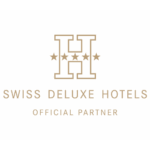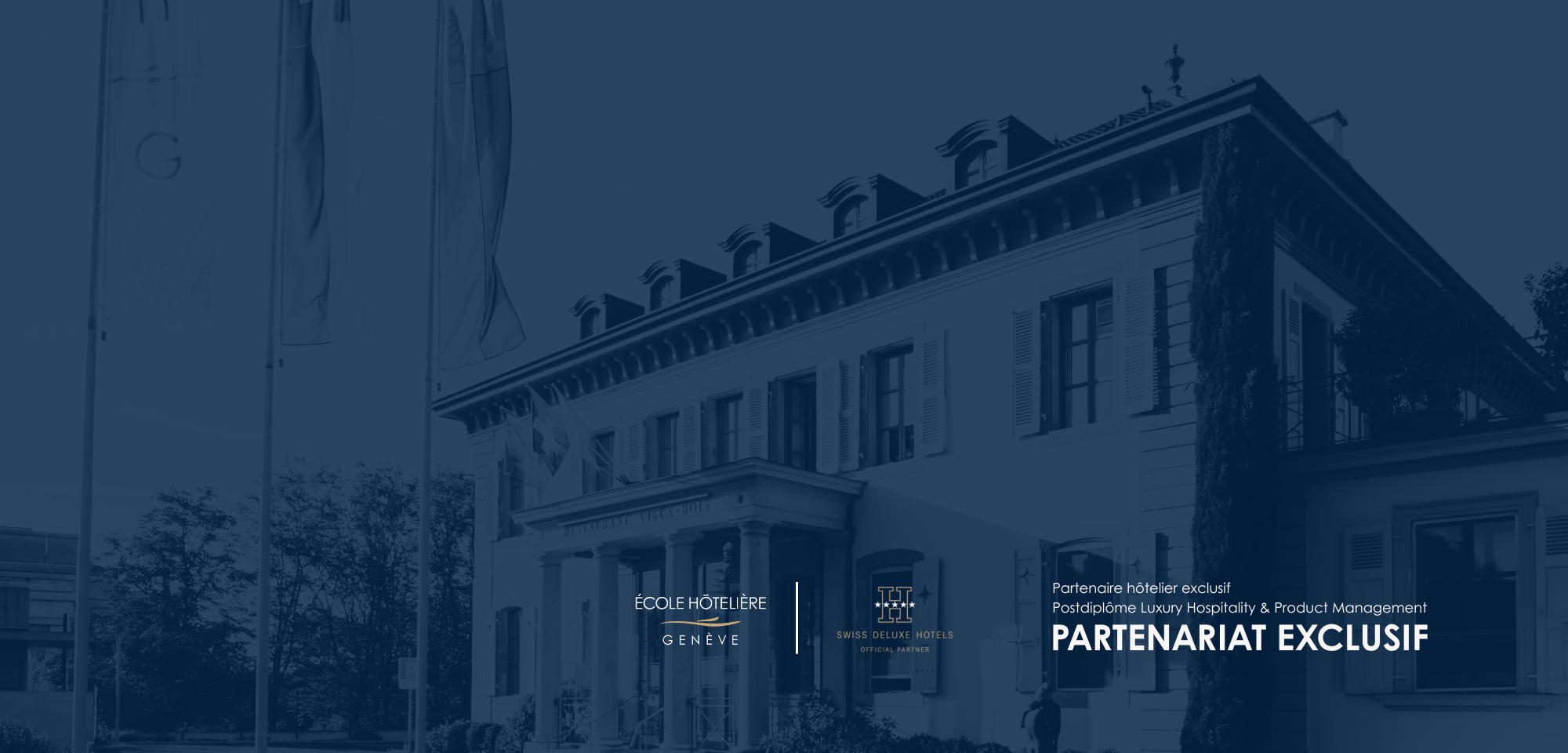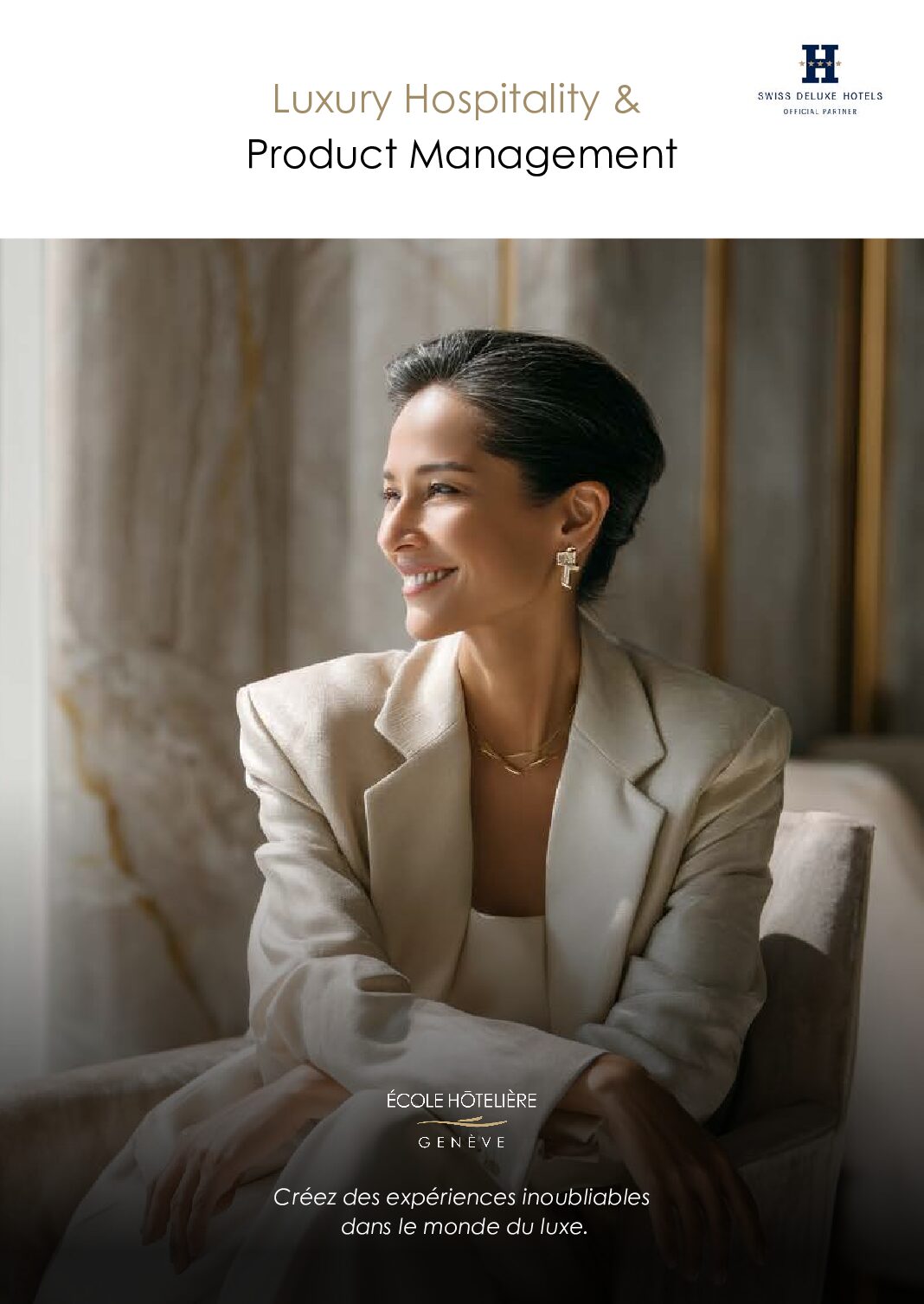Explore the excellence of luxury hotel management with our post-graduate Luxury Hospitality & Product Management program, designed to train tomorrow’s leaders in the prestigious world of luxury.
Discover the world of luxury
Program overview

“At Swiss Deluxe Hotels, we are committed to passing on our know-how and recreating desirability around our professions. This program embodies our commitment to supporting tomorrow’s talent and promoting the excellence of Swiss luxury.” – Nathalie Seiler-Hayez, Managing Director, Swiss Deluxe Hotels
This pioneering program aims to develop in-depth expertise in the management of luxury hospitality and high-end products.
By immersing themselves in aspects of refinement, innovation and trend, students acquire critical skills in strategic planning, brand management and experiential marketing. Aimed at those who aspire to excel in the most exclusive segments of the market, this program offers the tools needed to create unrivalled customer experiences and successfully lead luxury brands and products.
Graduates of the Luxury Hospitality & Product Management program are offered career opportunities in various prestigious areas of the luxury industry.
Join us
Key information

Duration
1-year course and 6 months for the business project

Hybrid curriculum
Designed to adapt to your professional rhythm

1o Modules
A training path designed for your development

Federal Diploma
*Title obtained: Expert in Luxury Hospitality and Product Management EPD ES
The program is supported by an exceptional academic partnership: Swiss Deluxe Hotels, a network of 43 of Switzerland’s most prestigious five-star hotels, is the program’s exclusive hotel partner.
This exclusive collaboration reinforces the immersive, professional approach of the program, combining academic excellence with contemporary Swiss luxury.
In concrete terms, this means for our students:
- Presentations by SDH executives in each module,
- Immersive tours of iconic properties such as The Dolder Grand, Baur au Lac and Kulm Hotel,
- Case studies and real projects submitted by member hotels,
- Privileged access to an elite professional network,
- And targeted career opportunities with recruiters looking for talent trained to Swiss luxury standards.

Career prospects
-
Luxury Brand Manager :
Manage and maintain the image of a luxury brand, developing strategies to strengthen its market position.
-
Innovation Strategist :
Steer innovation initiatives within luxury companies to stay ahead of trends and respond effectively to the expectations of luxury consumers.
-
Trend Analyst :
Study markets and anticipate consumer trends to advise on the future development of luxury products and services.
-
Experiential Marketing Specialist :
Create and execute marketing campaigns that deliver memorable experiences and strengthen high-level customer engagement.
-
Luxury Goods Sales Director :
Manage sales strategies for luxury products, ensuring revenue targets are met while preserving brand exclusivity.
-
What to do next :
This program is ideal for those who aspire to move into leadership roles within the luxury industry, where they can leverage their sophisticated understanding of luxury to influence and innovate in a competitive global marketplace.
*Diploma in the process of being recognized
Discover the luxury hospitality and product management modules
Final business plan
Business project: from learning to action
The Business Project acts as a veritable incubator of ideas: it enables you to apply all the skills you have acquired in response to a real or fictitious challenge in the hospitality sector. The project encourages you to innovate, to think like a strategist, and to structure concrete solutions worthy of tomorrow’s leaders.
This culminating module enables you to demonstrate your ability to apply analytical, strategic and creative skills to develop innovative solutions to complex problems.
By completing this project, you will demonstrate your ability to conduct independent research, think critically and communicate your ideas effectively, preparing you for leadership roles in the hospitality industry.
This module is the pinnacle of your learning path, consolidating your preparation to make a significant difference in your professional career. Open the door to your dreams, register now.
EHG Continuing Education
Discover our other post-graduate courses
Contact
Hotel Management School Geneva
Avenue de la Paix 12
1202 Genève
Tel: +41 22 919 24 24















